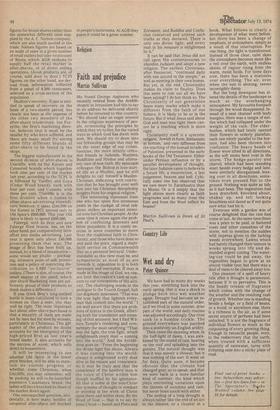Religion
Faith and prejudice
Martin Sullivan
My friend George Appleton who recently retired from the Archbishopric in Jerusalem had this to say in an address he delivered shortly before he returned to this country: "We should take an eager interest in the religious experience of people, reverencing the principles by which they try to live, for the varied ways in which God has dwelt with men. We should try to draw into our fellowship groups that may be on the outer edge of our constituencies, the more strictly orthodox friends in Judaism, Muslims, Buddhists and Hindus and ultimately men of non-faith. My episcopal colleague, the Bishop in Iran started life as a Muslim, and he still delights to call himself a MuslimChristian, indicating with conviction that he has brought over with him into his Christian discipleship insights from his original religion."
This interesting statement from one who has spent five strenuous years in the cockpit of rival religions, strikes an important eirenical note for Christian people. At the same time it raises again the problem of conflicting interests and bitter prejudices. It is a costly exercise in some countries to move from the traditional faith to Christianity, and those who have done so and paid the price, regard a multifaith service on Commonwealth Day as a personal betrayal. Understandable as this view must be, and sympathetic as most of us are towards it, opposition to it is both necessary and inevitable. If man is made in the image of God, we cannot limit the creator's care or concern to our conceptions of His activity. The challenging words in the prologue to the Fourth Gospel, halt our dogmatic assurance. "That was the true light that lighteth everyman that cometh into the world." I am well aware that there are problems of syntax in the Greek, affecting both the translation and meaning of this sentence, but I find William Temple's rendering and commentary the most satisfying: "That was the light, the true light, which enlighteneth every man — coming into the world." And the Archbishop goes on: "From the beginning the divine light has shone. Always it was coming into the world; always it enlightened every man alive in his reason and conscience. So it may be truly said that the conscience of the heathen man is the voice of Christ within him though muffled by his ignorance. All that is noble in the non-Christ tian systems of thought or conduct or worship is the work of Christ upon them and within them. By the Word of God — that is to say by Jesus Christ — Isaiah and Plato and Zoroaster, and Buddha and Confucius conceived and uttered such truths as they declared. There is only one divine light; and every man in his measure is enlightened by it."
It can be said that Jesus did not call upon His contemporaries to abandon Judaism and adopt a new religion. The earliest Christians, after Pentecost, "continued daily with one accord in the temple," as well as meeting in their own homes. But yet, in the end, Christianity makes its claim to finality. Does this seem to rule out all we have been saying? I do hot think so. The Christianity of our generation bears many marks which make it different from the faith of our fathers. It is likely to be so in the future. But if what Jesus said about God and man was right there cannot be a teaching which is more right. Christianity itself is a syncretic religion, 'Jewish in form, Hellenistic at bottom,' and very different from the teaching of the nomad invaders of Palestine, presented in the early books of the Old Testament. Either under Persian influence or by a parallel development of thought, the later Judaism came to believe in a future life, a resurrection, a last judgement, heaven and hell. CYhically some one has observed that we owe more to Zarathustra than to Moses. Or is it simply that the light shines more clearly as faith progresses and as many from the East and from the West reflect its beams?
Martin Sullivan is Dean of St Paul's.


































 Previous page
Previous page